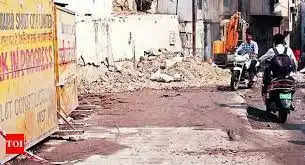Udaipur Faces Challenges in Smart City Developments
Need for comprehensive planning and action...
Udaipur Smart City is making progress with its initiatives; however, rather than experiencing organized development, the city is regressing due to haphazard activities. Whether it pertains to measuring the happiness of the people, engaging in discussions about cleanliness, preserving heritage, providing facilities for tourists, addressing crime control or managing traffic, it is important for the city to excel on every front. There is a pressing need to enhance the quality of life for the residents here.
Happiness Index Needs Improvement
The Udaipur district experiences an annual development growth rate per person of only 4.12 percent, compared to the expected 7 percent for extremely backward countries. In this context, there is a pressing need to redefine the economic development strategies of the district. The key to prosperity lies in fostering GDP growth. Presently, we significantly lag behind in the Happiness Index. Looking ahead to the next 7 years, there is an imperative to bolster GDP growth and institute improvements. Enhancing the standard of living for people, spanning from the city to the villages, is crucial.
Heritage Conservation Needed
Rajasthan has six locations listed by UNESCO, but Udaipur's heritage is notably absent from the list. Jaipur, founded in 1727, holds the distinction of being recognized as a heritage city, whereas Udaipur, established in 1559, does not share this recognition. It is imperative to exert efforts at both the national and international levels to preserve our heritage. This objective should be realized by the year 2030. Achieving this goal will not only bestow global recognition upon the city but also contribute to an increase in tourist influx.
Medical Sector
Despite Udaipur emerging as a medical hub, our reliance on major cities for healthcare persists. Udaipur is positioned at 78 points concerning the population receiving treatment in hospitals. Across various healthcare indicators, such as infant mortality rate, vaccination coverage, suicide rate, institutional deliveries, family planning, and childbirth, Udaipur scores 43.77 points, whereas Rajasthan scores 54.20 points. When compared to other districts, Udaipur ranks at the bottom, excluding Jaipur. Looking ahead to Vision 2030, there is a critical need to double the existing medical facilities in Udaipur to achieve significant improvement.
Clean Udaipur
While the city is classified as a Smart City, it does not excel in terms of cleanliness. Udaipur ranks 122nd in the current list of clean cities. Although the initiative of door-to-door waste collection has been introduced, the outcomes are not up to par. Considering the scenario in the year 2030, it is essential to cultivate cleanliness as a habit rather than solely relying on the administration to shape the city's clean image.
Environmental Conservation
In the Udaipur district, 23.49 percent of the area is forested, yet only 0.39% is included in its afforestation plan. Udaipur boasts the highest forest cover in the state, necessitating preservation efforts. There is a concern that the forest cover in Udaipur may diminish by 2030. It is imperative to halt unregulated logging of trees and poaching. Encroachments into the forests must be eliminated.
Improve Traffic Management
At present, just 2.76 percent of the city's total two-wheeler and four-wheeler vehicles are hybrid, and a mere 4% are electric. There is a pressing need to promote these technologies. Upgrading the infrastructure and embracing clean technology are essential for the city's sustainable development by the year 2030. To manage traffic effectively, we must focus on constructing additional elevated roads, flyovers, and underpasses.
Crime Control
Crime rates have surged, posing challenges across the state. Among district police superintendents, Alwar holds the top position, followed by Jaipur City East in second, and Udaipur in third. Presently, the city lacks a 24-hour working environment. Anticipations suggest a further increase in crime by 2030. It is important to establish a secure environment and bolster technological advancements in crime control.
Tourism Sector
The economic system is vital in the development of any city. While tourism is flourishing, our economy is comparatively weak. Annually, around 1.5 million tourists visit, a number more than double in relatively smaller cities like Udaipur. To elevate tourism, it is imperative to offer tourists a secure environment and improved facilities.
Conservation of Lakes
The city is famous for its lakes, but encroachment is on the rise. The expanse of Pichola Lake, once at 6.5 square kilometers, has diminished to approximately 4 square kilometers. Similarly, the perimeter of Fateh Sagar Lake, originally around 5 kilometers, has now contracted to about 4 kilometers. If this trend persists, preserving the lakes by 2030 will prove to be a formidable challenge. It is imperative that we commit to preventing encroachment on the lakes and ensuring their continued purity.
Sustainable Development
Udaipur is undergoing rapid expansion, but the growth lacks proper planning. In terms of sustainable development, Udaipur holds the 25th rank in the state, with an accomplishment of only 57.88 percent of the established goals. Initially confined within an eight-kilometer radius, the city's expansion has now reached the UIT periphery area, extending its radius to 17 kms. There is a potential for the city's radius to reach 50 kms by the year 2030. While urban expansion is occurring swiftly, the organization and regulation of colony layouts are lacking. Colonizers are establishing unauthorized colonies, disregarding anti-colonization rules.
Source: Rajasthan Patrika
To join us on Facebook Click Here and Subscribe to UdaipurTimes Broadcast channels on GoogleNews | Telegram | Signal



